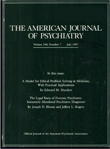Does risperidone improve verbal working memory in treatment-resistant schizophrenia?
Abstract
OBJECTIVE: Treatment efficacy in schizophrenia is typically defined in terms of symptom reduction. However, new antipsychotic medications could potentially have an impact on aspects of disability, such as neurocognitive deficits. The authors evaluated the effects of risperidone on verbal working memory, a memory component of theoretical interest because of its link to prefrontal activity and of practical interest because of its link to psychosocial rehabilitation. METHOD: Verbal working memory of 59 treatment-resistant schizophrenic patients was assessed as part of a randomized, double-blind comparison of treatment with risperidone and haloperidol. Verbal working memory was measured under both distracting and nondistracting conditions at baseline and after 4 weeks of both fixed- and flexible-dose pharmacotherapy. RESULTS: Risperidone treatment had a greater beneficial effect on verbal working memory than haloperidol treatment across testing conditions (with and without distraction) and study phases (fixed and flexible dose). The treatment effect remained significant after the effects of benztropine cotreatment, change in psychotic symptoms, and change in negative symptoms were controlled. Neither benztropine status nor symptom changes were significantly related to memory performance. CONCLUSIONS: Treatment with risperidone appears to exert a more favorable effect on verbal working memory than treatment with a conventional neuroleptic. The beneficial effect appears to be due, at least partially, to a direct effect of the drug, possibly through antagonism of the 5-HT2A receptor. Results from this study suggest that pharmacotherapeutic efficacy in schizophrenia treatment could be broadened to include impact on neurocognitive abilities.



